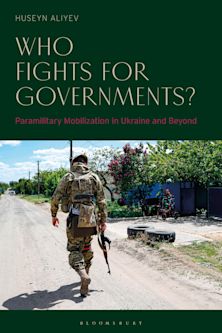- Home
- ACADEMIC
- Politics & International Relations
- Military Strategy and Warfare
- Forensic Rhetorics and Satellite Surveillance
Forensic Rhetorics and Satellite Surveillance
The Visualization of War Crimes and Human Rights Violations
Forensic Rhetorics and Satellite Surveillance
The Visualization of War Crimes and Human Rights Violations
This product is usually dispatched within 1 week
- Delivery and returns info
-
Free US delivery on orders $35 or over
You must sign in to add this item to your wishlist. Please sign in or create an account
Description
Forensic Rhetorics and Satellite Surveillance: The Visualization of War Crimes and Human Rights Violations uses cases studies of satellite surveillance over the skies of Darfur, Gaza, Bosnia, Pakistan, and the Mediterranean to provide readers with an overview of some of the technological, analytic, and political complexities of satellite surveillance imagery usage. Marouf Hasian, Jr. illustrates how our earlier reliance on witness testimony or signal communications in human rights contexts is now being supplemented with forensic evidence from satellites that can be used to document, monitor, and perhaps even deter human rights violations on the ground.
Table of Contents
Acknowledgments
Illustrations
Chapter 1: Satellite Imaging, Humanitarian Dreams, and the 21st Century Pursuit of Forensic Truths
Chapter 2: Visualizing Srebrenica, The International Criminal Tribunal For the Former Yugoslavia (ICTY), and the Growing Acceptance of Satellite Evidence
Chapter 3: Satellite Imagery and the Visual/Virtual Israeli Occupation of the Gaza
Chapter 4: George Clooney, Surveillance of Sudanese Borders, and the Sentinel Project
Chapter 5: The Drone Wars Over Pakistan and the Aerial “Manhunts” for Taliban and Al Qaeda Enemies
Chapter 6: EUROSUR Surveillance, Mediterranean “Search and Rescue,” and the Visualization of Europe’s “Migrant Crisis”
Chapter 7: Conclusion: The Constitutive Power of Satellite Surveillance and the Crafting of Securitized and Militarized Dispositifs
Bibliography
Index
Product details
| Published | Jul 25 2016 |
|---|---|
| Format | Hardback |
| Edition | 1st |
| Extent | 252 |
| ISBN | 9781498535908 |
| Imprint | Lexington Books |
| Illustrations | 4 BW Photos |
| Dimensions | 9 x 6 inches |
| Publisher | Bloomsbury Publishing |
About the contributors
Reviews
-
Hasian’s volume offers a valuable contribution to the growing body of work that engages rhetoric and security. The volume pinpoints deadly intersections of language, materiality, and humanitarian intervention. Its detailed, contemporary case studies usefully illustrate the ethics and politics inherent in competing, high-stakes interpretations of satellite imagery among states and citizens. Hasian cautions readers to attend to how forensic rhetorics construct crises in ways that bolster securitization and militarization. Readers will gain an in-depth and nuanced understanding of the suasory power of satellite surveillance.
Hamilton Bean, University of Colorado, Denver
-
Professor Hasian Jr. provides a theoretically rich, yet grounded, examination of the complex ways satellite surveillance is used to make truth claims. Hasian Jr.’s merging of critical theory and classical rhetoric is an example of the best efforts of rhetorical critics. The case studies provided by the book help open satellite surveillance to questions of epistemology. Yet, Hasian Jr. deftly avoids collapsing epistemology into ontology by opening necessary questions of rhetoric’s connection to the material world.
George F. McHendry, Creighton University
-
Professor Hasian's brilliantly delivered discussion of imaging intelligence and surveillance rhetorics demonstrates a frightening shift in public disputation, thresholds and uses of evidence, and public discourse itself; a shift that privileges the ocular power of satellite surveillance as if such imagery exerts only truth free from evaluation, dissent, discussion, and criticism. This book is a must-read for anyone concerned with the sanctity of public discourse as well as rhetorical, argumentation, and critical scholars.
Derek Buescher, University of Puget Sound



































